Amazon had a deal yesterday for a $79 refurbished Kindle Paperwhite. That’s $40 less than a brand new one, and convincing enough that it’s now backordered for 3 to 5 weeks.
But I didn’t buy one. Even though I really want one. It was as good of a deal as I’m likely to see for a long time, but I hesitated, for all the reasons that have held me back this whole time, until it was too late. I don’t even know if I should be sad or relieved.
And I really wanted one. Kind of. A little bit. Maybe. Allow me to explain.
Why I semi-desperately want a Kindle
In many ways, digital book readers are better reading devices than regular books, and it’s not just the space-saving tininess of their svelte little library-in-your-pocket profile. They’re also easier to read. One-handed operation, faster page turns, non-curved reading surfaces, occasional built-in lighting, lighter weight, lack of app distraction, and font customization all combine to make quite a compelling case that digital books provide a better reading experience than paper. Just imagine trying to read a paper book while lying down on your side, for example. What a nuisance.
For all of these reasons, Kindle owners simply read more, with estimates claiming they consume anywhere from double to quadruple the number of books as those who read only print. Maybe they were reading voraciously already, which is why they bought a Kindle, but the advantages of digital reading, combined with the ease of getting exactly what you want immediately, are surely a significant part of the equation.
But most importantly, when I travel, I burn through books at a ridiculous rate, devouring them much faster than I can manage at home, often going at around one book per week. I feed myself as many books as I can while I’m gone, because I know I won’t be able to keep up the pace back home. On the last trip, I read a whole book in a single day (fun fact: It was Armistead Maupin’s The Night Listener).
It’s easy to see why; the internet is less of a ubiquitous distraction, even with readily-available free hostel Wi-Fi. Long bus rides, train trips, and flights carve out massive blocks of uninterrupted free time, occasionally preceded by an hour or two spent in the waiting area as well. Spending all day reading is sometimes the only option.
It’s true that tablets and smartphones can help pass the time with movies and games, but voracious readers aren’t likely to spend much time tapping away on them before opening up a good book. Besides, those horrific 36 hour bus rides will drain the batteries long before you arrive at your destination, in which case a good book is often the only reliable way to keep you from going completely insane.
There’s just one horribly insurmountable problem: Finding books.
Unless you’re a omnilingual language genius, you’ll probably be on the lookout for English-language bookstores, hostel book exchanges, or fellow reading buddies with whom you can trade a book or two. This all sounds great.
In reality, it’s a horrific nightmare. Depending on where you are, English-language bookstores and book exchanges might be completely nonexistent, and hostel roommates might not be readers. Or maybe they do have books, but they’re terrible. Argh!
Another semi-solution is to bring a single book that’s a thousand pages long, or carry several at the same time. I once met a guy carrying twelve. You’ll get spinal injuries from hauling them around all day, but at least you won’t get bored.
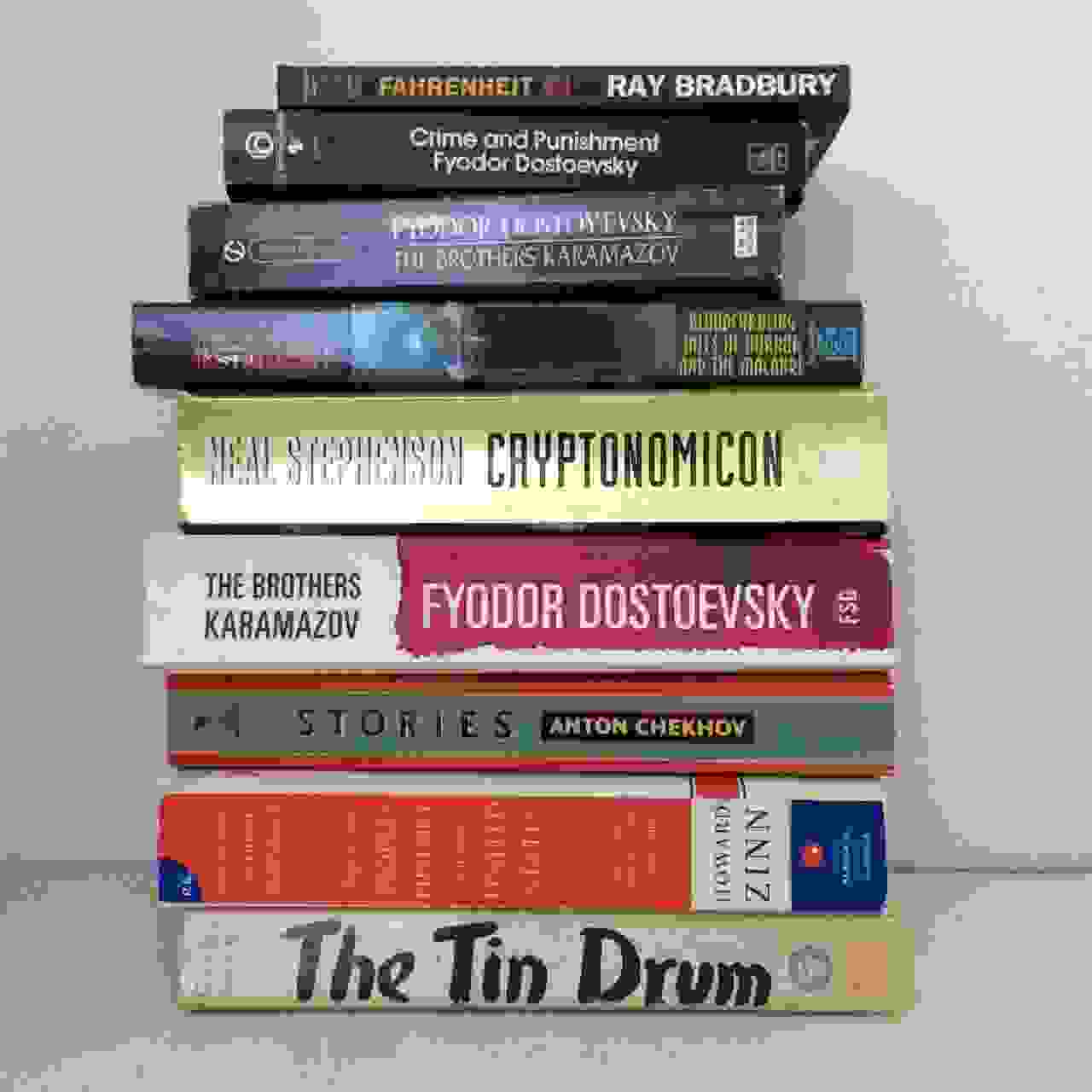
Damn. Wouldn’t it be great if there were a solution that provided convenient access to all sorts of great books, but won’t weigh you down or run out of batteries in a matter of hours? Yes, it totally would!
Sadly, the publishing industry seems to think otherwise.
Why I’ve held out on buying a Kindle for so long
For many reasons, digital book readers have failed to sufficiently kindle (ha!) my interest, though it has far more to do with the book industry in general, rather than the devices themselves. There’s nothing particularly wrong with a Kindle, and there’s lots to like. The two major problems, at the moment, are exclusively the fault of publishers:
Problem #1: Digital books are stupidly expensive
You know how much it costs to email someone a file? Nothing. And that’s essentially what it costs for a publisher to send you an ebook.
Sure, there are still plenty of costs associated with operating the business itself, and digital distribution networks aren’t free. But they’re significantly cheaper than print distribution, which is why publishers have been enjoying greater ebook profit margins, despite flat revenue. Ebooks are significantly cheaper to produce, store, and sell. So why aren’t they cheap to buy?
Consumers have frequently complained about the nonsensical irony of ebooks often costing more than print versions. Publishers are just gouging customers into paying higher prices for cheaper products, and consumers know it. Even if ebook prices were equal, or even slightly favorable, it would still be unfair, because they should be significantly cheaper.
Too bad they’re not.
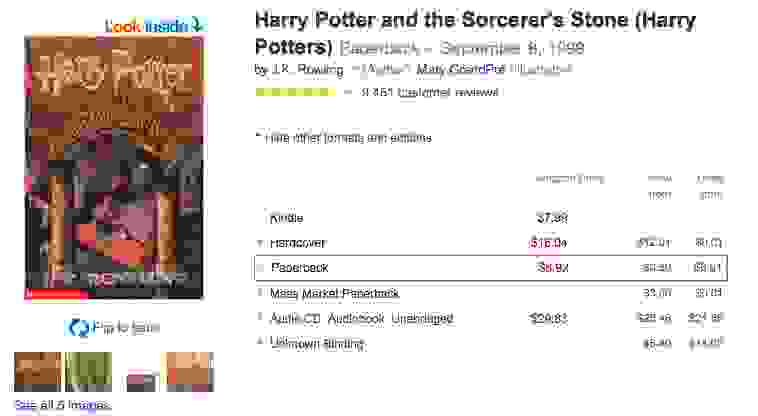
Yes, you can get a brand new copy of Harry Potter for 50 cents, while the Kindle price is 16 times higher. Even after factoring in shipping costs for the physical book (an additional $3.99), it’s still just a little over half the price of the Kindle edition. Plus you’ll get the book, which you can lend to friends. If digital books are supposed to compete with physical books, they should be cheaper than paper copies.
Making them cheaper, by the way, also makes them more profitable. Amazon has done a lot to communicate that books are very “price elastic,” meaning that when you sell the same book at a lower price, more people buy the book; that’s obvious enough, but, more importantly, so many more people buy the book that you make more money, even with lower prices.
In other words, they could drop the price in half, and they’d sell more than twice as many books. That’s already pretty great, but as an added bonus, authors would more than double their fan base. This is just a textbook (ha!) case of a win-win for everyone, and publishers are stupid for not jumping all over it.
You know what makes it even stupider? Used bookstores. Every time I look at ebook prices, I just go straight to the used bookstore down the street, which has just about every book I can possibly imagine, always at lower prices than any digital version (with the exception of old books whose copyright has expired, and thus are free). Why would I bother paying over $100 for a digital book reader and then pay $10 per ebook when I can get all the books I want for $7 each and then sell them back to the used bookstore and save even more?
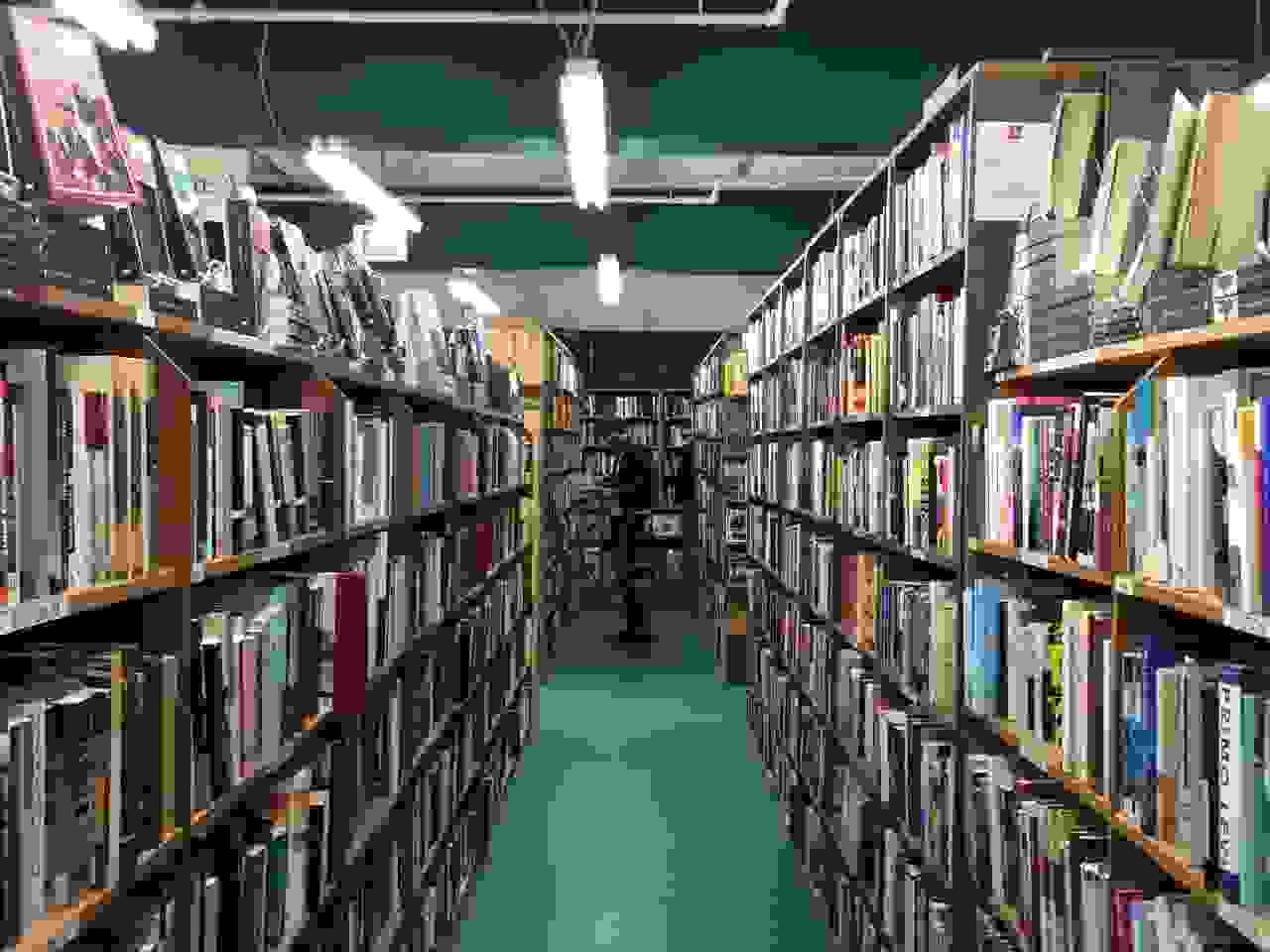
I just picked up a copy of Neal Stephenson’s Cryptonomicon for $2. It’s nearly 1,000 pages long, it’s a New York Times bestseller, and it was in the bargain bin for two dollars. The Kindle edition is $4.99. No wonder I love used bookstores so much.
Here’s another:
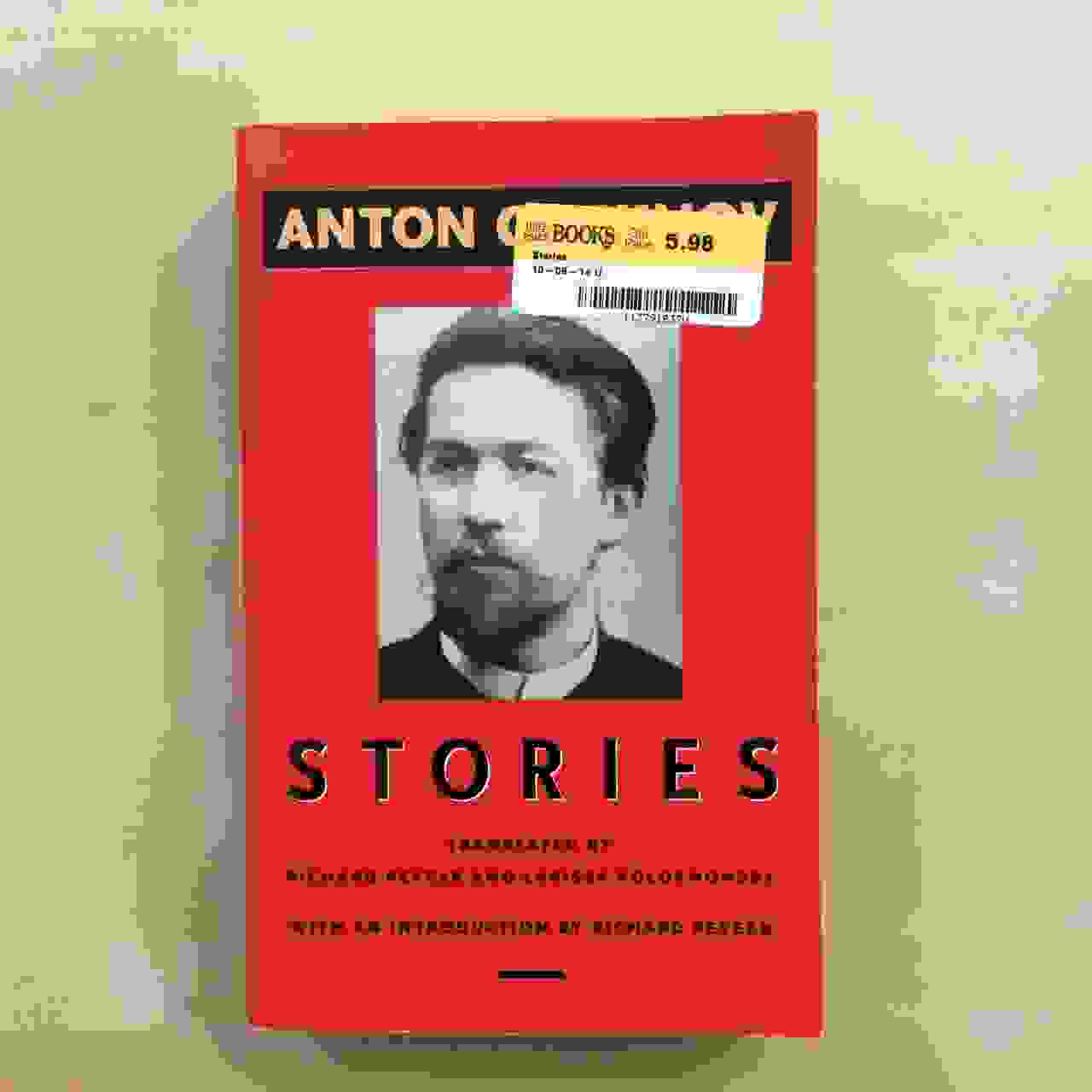
Ironically, it’s non-used books that make me feel used.
What an indisputably clear message it sends as to how stupid the publishing industry is for driving readers toward cheaper alternatives that make absolutely no money for the author or the publisher.
Seriously, what a stupid plan.
Problem #2: Digital books are stupidly unavailable
This predicament is changing rapidly, as it seems more and more books are available as digital versions all the time, but especially in the case of subscription services such as Kindle Unlimited and Oyster, which are clearly the future of digital book distribution, many of the books are simply not there.
In the case of Kindle Unlimited, a service which publishers are apparently trying to sabotage before it even has a chance, it’s especially problematic; most of the books available seem to be amateur erotica from the legions of moonlighting authors self-publishing on the site. If that’s what you love, well then, Kindle Unlimited is for you!
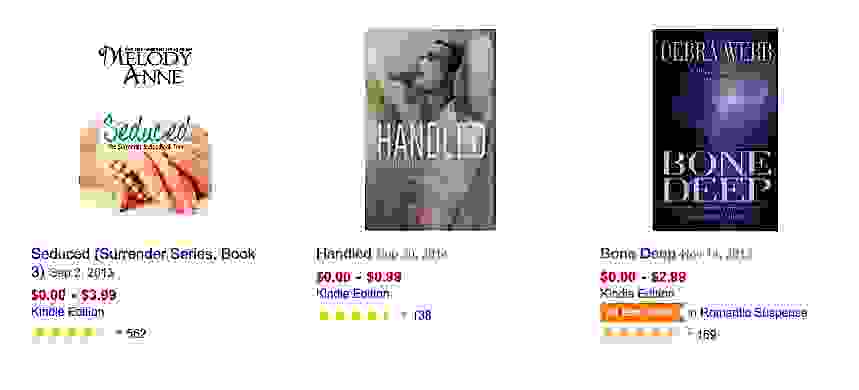
I’m exaggerating, but only slightly.
Oyster, at the moment, has 500,000 books. Compare that to the total number of books in existence (130,000,000), and you start to see the problem. Why would I pay $10 a month for “unlimited” books if I still have to shop elsewhere for Haruki Murakami? It’s certainly not Oyster’s fault, but it’s still a problem for readers looking for a reasonable solution.
It’s all just a huge mess.
My stupid Kindle solution
As someone who likes to travel, I’m getting a Kindle. It’s inevitable. I read too fast and run out of books, and get stuck with nothing to read, and I’m too scrawny to carry more than a few at a time. Getting a Kindle is the only way to resolve this problem. Reading on a phone or a tablet drains the battery, isn’t as comfortable, and hurts my eyes. Kindle it is.
Unfortunately, it’s expensive. Anywhere from $70 to $200 for the Kindle itself, and about $10 per book. At one book per week, that’s $40 a month, which is quadruple the price of subscription services, and $40 more than trading books with hostel buddies for free.
It’s certainly not a crippling expense, but it’s still an unjustified premium just for the luxury of using a Kindle, while publishers rake in higher profits by selling digital copies. But at least that way I’ll have something to read while I’m traveling, and I can save a little by reading older books with expired copyright that can be downloaded for free.
At home, I’ll just go to the used bookstore, buy the books cheaply, and return them back to the same store after I’m done, thus providing zero dollars in royalties to publishers and authors. And if you say “library,” I’ve tried. Finding what I want just doesn’t happen often enough to be worth my time (plus it smells weird), whereas a visit to the used bookstore has never left me disappointed.
This, clearly, is a stupid solution. It’s simultaneously less convenient and more expensive for me, and makes less money for authors and publishers. Nobody wins. Except the used bookstore, which I’m happy to support. But I’d prefer a reasonable alternative.
Which I can describe:
My ideal Kindle solution
In a perfect world, I’d have a Kindle, or some equivalent device, with a $10 per month subscription service that would include every book in the world, with a well-designed curation system that would feed me books I’d like as often as possible. I’d be overjoyed.
For those who have less frequent reading habits, subscription services don’t make much sense. They should be able to download digital books for $5 each. Quit fussing, publishers. We’ll just go to the used bookstore instead. It’s what we’ve been doing this whole time anyway. Also, the first 50 pages of every full-length novel should be free. With 130 million books out there in the world, sampling is a necessity.
Physical copies will still exist, whether new or used, because some people just like having a paper copy, and they’re more practical for people who read only occasionally, for whom a $100 dedicated book machine doesn’t make much sense, which is why I expect books will prove far more resilient than other physical media, such as music and movies, so there’s no reason to lament the impending death of the neighborhood bookstore.
Everyone would be happy…but it’s nowhere close to where we are now. Sigh!
I do, however, have an alternate proposition:
Why Amazon should give everyone in America a free Kindle
Oh yes.
Amazon has repeatedly pointed out that it doesn’t care if it makes no money selling underpriced devices, as long as it can go on to sell books and movies through them. Seems pretty straightforward, but let’s see how far we can push it.
Low-end Kindles cost about $80 to manufacture. I don’t know how the hell a black and white text machine is so damn expensive, but whatever.
So let’s say they hand out a free Kindle to every single person the United States, currently totaling somewhere around 300,000,000 people. Obviously it’s stupid to hand out free Kindles to newborn babies and so on, but half the point of this thought experiment is the audacity of it all. So let’s just say they blanket 100% of the population with a cool new free toy, including those who already have one. Grand total cost: $24 billion.
And remember how Kindle owners quadruple their book purchases? They’d go from the current American average of 5 books per year (I’m using the median, rather than the mean), all the way to 20.
That seems pretty optimistic, though. In many cases it’s not the Kindle that makes someone read more, but heavy reading habits that motivate someone to buy a Kindle. So let’s just arbitrarily cut that in half and call it 10. That’s not even a book a month, so I’d say that’s pretty reasonable as a nationwide average, thus meaning a Kindle-enhanced USA would read an average of 3 billion books per year.
As for how profitable it is for Amazon to sell those books, that’s much trickier, as public information regarding those numbers is seemingly nonexistent; publishers make somewhere around $4 to $5 in profit per ebook, but Amazon’s revenue share is lower, generally somewhere around 30%, meaning for a $10 ebook they’d get $3, and that’s before taking into account the cost of operations.
Digital files, of course, are immensely cheap to mass-produce, store, and ship, which is why I’m inclined to believe ebooks are quite profitable, but since Amazon’s profit margins are famously slim, let’s just say they make a single, solitary dollar per ebook in profit.
In other words, they could give me, and you, and everyone in the US a free Kindle, and they’d make back their investment in 8 years.
I don’t know why they haven’t already sent us one.
Obviously these estimates lack the precision I’d like, but it would certainly go a long way towards kickstarting the digital book market, and we’d probably all read a whole lot more. I’m also inclined to view the purported decline of American reading habits as exaggerated. We’d read more often if we could get the books we want, the way we want, at the price we want.
Disclaimers and whatnot
My point here isn’t to take sides with one company over another, nor weigh in on the ongoing battle between Amazon, publishers, bookstores, and authors (though I should mention that this site is an Amazon affiliate, meaning that when I send readers to Amazon by suggesting products they might like, I get a commission from the sale). I have mixed feelings about the Amazon’s place in the book market, but find it incomprehensibly stupid that publishers complain about Amazon’s alleged monopoly all the time, instead of just opening their own damn online bookstore and selling the books themselves. Seriously, who’s stopping them?
Besides, I don’t particularly care if I get my books from Amazon or elsewhere, or if I read them on a Kindle, or some equivalent device. I just want good books dammit. But I literally cannot find an ideal solution to my needs. I want the portability of digital books for more convenient travel, but digital books cost more than used copies, and subscription services often don’t have the right books. There’s simply nothing out there that’s properly addressing those issues.
Why? Why are publishers forcing a situation that works out for no one? Why are they fighting to keep prices higher than what I would find in the used bookstore, which provides them with zero royalties? Why are they fighting to keep digital books unavailable through subscription services? Why are they pretending to defend the interests of authors, while simultaneously refusing to share the increased royalties from higher ebook profit margins? For a variety of reasons, I don’t expect traditional publishers to exist much longer, and articles like this one make a solid case for why no one will mourn their demise.
I haven’t even addressed the problem of DRM-related non-portability, which disallows readers from reading ebooks on whichever device they choose. Much like any CD player should be able to play any CD, every digital book reader should be able to read any digital book. Non-portability only makes subscription services even more attractive, since they don’t force you into buying books that only work on one platform or another, which is yet another reason why buying into a digital ecosystem requires more tactical evaluation than it should.
Argh. What a mess.
Time to turn the page…
In the grand scheme of things, this isn’t a particularly huge problem. But what’s unfortunate is how people lament the decline of American reading habits, expecting the fall to be inevitable, with seemingly no hope in sight. I think the opposite is true.
Though people nowadays have far more entertainment options competing for their attention than they did 50 years ago, I expect the types of people who don’t bother reading today weren’t the types to do much reading back then, either. If you’re blissfully satisfied with Angry Birds, then War and Peace would have been a lost cause for you in any century.
Book lovers, on the other hand, will devour whatever they can get their hands on, and knowing that digital books have the potential to quadruple one’s reading habits, and that cutting the price of ebooks in half would more than double sales volume, there’s a pretty clear case for feeding book junkies with as much as you can throw at them, as cheaply as possible. If we’re all so worried about Americans reading fewer books, why not exploit the methods that encourage them to read more? Why not seize those opportunities with the same zeal with which readers would welcome them? Sigh.
I expect that sooner or later, all of these problems will be solved. Book lovers will have Netflix-like access to all the books they want, and they’ll marathon-read them the same way we all marathon-watched Breaking Bad. All day, every day, until we’re done.
We’re ready. It’s time to move on to the next…ahem…chapter of literary enthusiasm.
In the meantime, I’ll be at the used bookstore, enjoying every moment of it.
Minor update: I finally got one, and it’s exactly what I was expecting.




Keep up with the wonderful reviews! I also read constantly but but I read the classics for free. I had a kíndle and a nuke, but I only use now the mini iPad with several apps for ebooks including the nuke and kindle, plus it has a computer and a rudimentary camera for when you leave your extensiva camera behind.
This may or may not be of interest to you. I am a cookbook author. I attended a cookbook conference a couple of years ago and one of the panels was on ebooks: how they’re made, how they’re priced. It turns out that ebooks are much more expensive to create and format than one would think. Each book has to be appropriately formatted for the particular e-platform (they’re not all the same). So the Kindle platform is different from the Nook platform which is different from the Apple platform, etc. Which is one of the reasons that ebooks are more expensive than people think they should be. And if there are photos involved (which is the case for cookbooks), that adds a whole different level of complexity to the formatting issues.
Also, if a conventionally published book (one through a publisher) comes out in both a print and electronic version, the publishers don’t necessarily want to sell the ebook for 99 cents (even if that actually reflected what the ebook cost to create and format) when the print book is $15 (or whatever) because the amount of money that it costs to create the print version (which is something like a minimum of $100,000 for each book when all is said and done) needs to eventually be covered by sales of the book. This is why conventionally published books have Kindle (and Nook) prices that are only a few dollars below the print price.
Of course, authors who are self-publishing directly to Kindle are avoiding several layers of cost that go into conventionally published print books (author advance and royalties, editors, publicists, printing, e-formatting, advertising, etc). Since they don’t have the costs of printing a book and formatting it for every platform (since they are only selling on Kindle), they can reasonably sell their books for a small amount and still see a profit within a reasonable time.
Personally, I have a Kindle (an e-ink one that is several years old) and I love it. I am a voracious reader and read a couple of books a week. I buy new books, get books lent to me by friends, and I get ebooks from the library. Also, out-of-copyright books are often free on Kindle–which is awesome. I still read print books (especially things like cookbooks), but if it’s a novel, I tend to go ebook. And it’s a dream for traveling. Currently, Kindle Unlimited is not worthwhile for voracious readers–because there really aren’t that many books available on it. This is because it’s a cheap service for the readers and again, publishers and authors can’t recoup costs and make a profit from something like that. They need to make buying the book the most attractive option: this is why even library ebooks have a waiting list and have a limited amount of time allowed for borrowing.
Finally, one thing to keep in mind: each version of the Kindle will never go out of date (unlike a phone or a tablet or a laptop). Amazon wants to sell you books, so it’s in their interest to make sure that all of the Kindles, even the old ones, work. This is why your Kindle actually is a terrific investment if you’re a voracious reader. Like I said, mine is old (it’s a Kindle 2), and it works perfectly.
Thanks for listening (reading). Also, I love your blog!
Thanks for the details. It’s unfortunate that each platforms needs a different format, when there was already the ePub format that publishers tried to push, but apparently didn’t push very well. Picture books seem perfect for iPads and other tablets. Comic books especially. I think print-on-demand has the potential to change things; there’s already a machine that can print a mass-market paperback in 3 or 4 minutes, and it’ll look just like a regular book. It’s not as good as a trade paperback, but it works for mass market paperbacks. I think as the technology improves, it’ll take over more and more, except maybe glossy pages or embossed letters and so on, but then publishers wouldn’t worry about how many books to print. They’d just go with the flow. Someday!
Hi.
I see a bit of myself in your detailed pre-purchase Kindle analysis. I pondered a Kindle purchase for several years before finally taking the plunge by buying a Paperwhite as a Christmas gift for my girlfriend. Somehow it was easier to justify when it wasn’t for me, even though I knew I would get a lot of use from having the Kindle around.
We have purchased a few books (<10) at full Kindle prices, but what we really like are the "Delphi Complete Works" series on Amazon, where you get the complete works of an author (often including essays, newspaper articles, poetry, books and articles written about the author, etc.) for only $2-3.
Based on the authors/titles you mentioned in your post, this might be right up your alley. Yes, most of the works of the authors in the series are probably out of copyright and thereby technically free, but there is at least a couple dollars of value in not having to search for them yourself.
Also, several folks above advocated your friendly public library as an e-book source, and I will second that. No, they won't have every book you might want, but you don't really need every book you might ever want to read as an e-book at this very moment, you just need some e-books to read today or for the next month while you're travelling. So, you just get some library books in paper form and others as e-books and use them as such.
Happy reading.
I’m lucky to live in an area where I can request books via interlibrary loan using a website. So I have access to way more physical books than any bookstore. The downside is it usually takes a week or two for the books I request to materialize at my local branch library. Like the commenter above, I try to have a bunch of books on hold at any one time (closer to 6 than 30). Anybody who’s a big reader, lives near a library, and hasn’t tried interlibrary loan, you should give it a shot.
I’ve owned Kindles for years, and love them for traveling and commuting. I understand the angst over pricing. However, I also happen to belong to Amazon Prime, and I find that between the free book I am allowed to borrow each month, and my propensity to re-read books (particularly nonfiction), I am not spending that much. I was reading on my tablet for awhile, but do find that eInk is easier on the eyes.
I have a lot of issues with many of Amazon’s hardware and software decisions, including the fact that the books are DRM’d and can’t be properly backed up without de-encrypting them. I also feel that I should be able to lend or borrow ebooks, as I do with paper ones. I am not sure why I shouldn’t truly “own” an ebook in the same way I do a paper book, once I have paid for it. That said, I like the concept of an eReader and feel that I wouldn’t want to travel without one. On my latest trip my iPad Mini was even left at home in favor of my Kindle Paperwhite.
I would recommend picking up one of the cheaper models, if you can afford it, to try out. Perhaps look at the resale value on eBay so that you will know up-front how much you can get back for it if it doesn’t appeal. You might also check out the new Kobo Aura H20. It has some nice features, including being waterproof, that the Kindles lack.
Yes, the ownership debate is another issue; I wouldn’t mind it so much if the ebooks were dirt cheap, because you’re not getting the book the way you would with an actual book, which can then be lent to friends and so on. People who like to read are always on the lookout for books to borrow, but if someone suggests a book and it’s only $3, it turns into an impulse buy, whereas $10 for something they know very little about takes more evaluation. If ebooks are impossible to lend (although they occasionally have a way to digitally lend) then they should be really cheap, not just for the value we get from them, but because authors have no other way to reach fans who lose out from not being lent a book.
And I looked at the Kobo Glo, which was fine, but it did this web format for the text, with non-indented paragraphs, but wide line spacing between them, like all websites do, but which no books do. It’s just weird. The other models don’t do that, but they were bigger than I would have liked. I hope they fix this…it looks totally wrong, and there are some technical advantages to doing it the “normal” way when you’re reading a book.
So I purchased a Kobo Touch almost three years ago. I download books from my local library (no cost) … and have a subscription (no cost) to bookbub.com. I have read several hundred books in the last couple of years with my Kobo and have not paid for a single one.
Do I get the “latest” novels. Well, yeah, but sometimes I have to sit on my library’s waiting list for a week … or month. However, between bookbub.com and a wide, wide variety of free books available over the internet, I’m perfectly content.
A Kindle would work just as well … well, maybe not quite as well. My library always has more books in ePub format than they do in the Kindle format.
My strategy may not work for everyone, but I simply can’t afford $500 per year for books.
Don’t worry, that’s exactly the kind of strategy a book devouring literature fan needs. I did finally place an order for a Kindle, and I’ll be visiting Book Bub, and maybe giving the library another chance. They just never seem to have what I’m looking for, though…but maybe with better recommendation services, I’ll be able to find more of what I want.
If you bought a Kindle Fire you can read ePub formatted books if you download the Overdrive App. There is also an app (Calibre) that can convert ePub to a mobi file for use on the Kindle DX, if the book isn’t embedded with DRM (Digital Rights Management). Oh, it’s all so complicated, my head aches. But, generally if there is a will there will probably be a way.
My biggest complaint about ebooks is the 10’s of thousands of books that are out of print but not past the copyright © period.
They are earning the publishers nothing. Convert them to ebooks and sell them for $5.
I look at the books on my shelves or in the used booknstores, and would love to have them on a Kindle or tablet, but its not possible.
This is where the really short sightedness of publishers becomes apparent.
It’s backpacking grandma here to school you in Kindle Readership 101. I’ve been reading with my Kindle for years and I’ve been able to enjoy so many FREE books on Kindle that I can’t possibly finish my reading list. Plus, I can borrow books from libraries across the country. I can loan and borrow books from friends. Not every book published is eligible for “nearly free” reading, but I’m not a slave to fashion or best seller lists. I do read a ton of books written by indie authors who often flog their wares for 99 cents a book. I’ve just recently learned about the Kindle Unlimited program ($9.99/month) that lets me read a huge selection of books for free. Now that I’m officially retired I can read 2-3 books a day! You can also download PDF files to your Kindle, and for a small fee you can e-mail documents that are converted to PDF and sent to your Kindle wirelessly. I haven’t met an e-book that I couldn’t covert to a format that wasn’t readable on my Kindle. Not have a Kindle? I just upgraded to a Kindle DX and still won’t get rid of my legacy Kindle. Can’t live without them!
That’s a very long whiny rant! Try living in NZ and paying the prices we do for books from a bookstore, usually $25-$40 for new paperbacks.
I LOVE Kindle and $10-$12 for a new book is perfectly acceptable.
You stated that you can save “a little” by buying books that are out of copyright, you can save a bundle, in fact if you want holiday/travel reading you don’t have to pay anything, just get a dozen or so old classics that you have never read or want to read again.
Happy Reading and GET A KINDLE!
Actually I did pick one up recently, so I’m looking forward to it (and I meant you save a little per book, but you’re right that overall you save a lot if you read 500 books from the 1800s).
I am still dragging my heels, I use the kindle app on iPad and have a backup battery in case of emergency. God knows I stalk power outlets in every cafe/restaurant I visit though.
In the Netherlands (as an English reader) library/used book store isn’t an option and a new release is around 30 EUR, so it saves me a ton of money. I agree on the prices though, what particularly annoys me is vast difference between .com / .uk / .de pricing.
Yup, that’s another good point. I think we have it easier in the US than elsewhere, in general, so it might make sense to get a Kindle outside of the US.